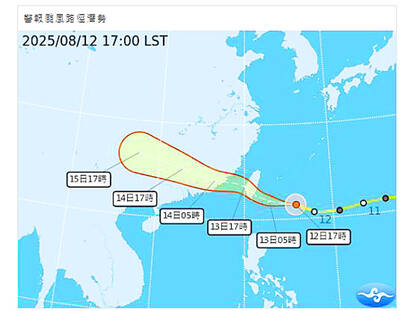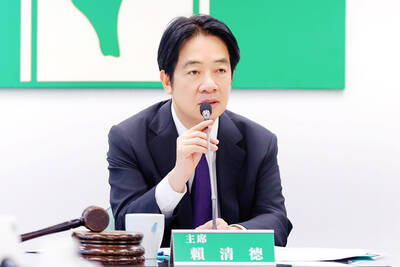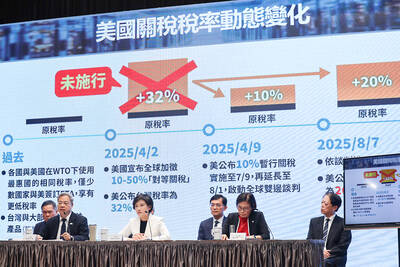As the music download market grows more competitive on its home turf of Japan, Sony, the inventor of the Walkman, is arming itself with style -- handheld music machines that look like jelly beans.
The struggling electronics icon is to launch a new digital Walkman dubbed the "Walkman Bean" in late October as it takes aim at Apple Computer's phenomenally popular iPod.
The pop design targets "young people and women," according to Sony Marketing communications manager Saori Takahashi.

PHOTO: AFP
"The core users [of digital portable music players] have been men in their late 20s or older who like cutting-edge gadgets, but demand is now spreading to younger age groups and women," she said.
Apple opened its online download service iTunes Music Store on Aug. 4 in Japan, the world's second-biggest music market after the US.
It made an impressive start, hitting one million downloads within four days, the fastest pace in the 20 countries where the service is available.
Music downloading has just started spreading in high-tech Japan, where rental CD shops -- unheard of in the US -- let consumers copy music for non-commercial, personal use.
The arrival of iTunes appears to have stimulated the market further. Another download service, Mora, affiliated with Sony, said downloads rose to 500,000 songs last month from the previous monthly sales of 450,000.
As the iPod swept the world, Sony last year used the 25th birthday of the Walkman, which in its time had revolutionized music, to announce the launch of hard drive-based portable music players.
The Network Walkman NW-HD1, following a line of 1,100 Walkman models, made its debut in July last year in Japan, followed by the April launch of the flash memory-based Walkman Stick to counter iPod Shuffle.
The Stick, designed like a slim perfume bottle and boasting 50 hours of playback on a single charge, has helped raise Sony's share of the market.
Apple held a combined 35 percent share in Japan's market of hard drive and chip-based portable music players in July, down from 45.1 percent a year earlier, according to BCN, a Tokyo-based firm conducting IT industry research.
Sony was second-ranked, with a share of 19.5 percent, up from 7.7 percent a year earlier.
As an entertainment conglomerate with software content, Sony lagged behind Apple in opening up digital music players' market due to concerns about copying on digital format. It was also late in adopting popular MP3 formats.
For a latecomer, Sony "got off to a good start," said Kazumasa Kubota, electronics analyst at Okasan Securities. But he warned against concluding that the Walkman's founder was making a strong comeback.
"Japan's digital music player market is much smaller than the US one," he said.
"Profitability will also be a problem even if its share expands" amid a price war, he said.
Sony has drastically cut its profit forecast for the current financial year as depressed electronics prices hit its earnings.
Kubota said it "looks impossible" for Sony to overthrow Apple given the US company's overwhelming dominance in the sector. Sony's business priority would be elsewhere such as games and flat-screen televisions, he said.
Some analysts doubt whether Japan's music download market will make explosive growth as in the US.
Kazuharu Miura, analyst at Daiwa Institute of Research, pointed to the rental CD shops.
"You need to have personal computers for online music downloads. Besides, junior-high and high school students, who spend a lot on music, have no credit cards, making rental shops more convenient for them," he said.
Downloading and listening to music with mobile phones has also proved popular in Japan. Telecom carrier KDDI's downloading service hit 14.2 million songs by Aug. 1 since its launch last November.
But one song can cost about ?2,700 (US$24) unless the user is subscribed to fixed-rate or other discount services.
The latest Walkman Bean, to be launched on Oct. 26 here and around the date elsewhere in the world, pops up a UBS jack to be connected into a computer without a cord.
Sony expect a retail price of about ?20,000 for a one-gigabyte model, about 30 percent costlier than an iPod Shuffle.

GET TO SAFETY: Authorities were scrambling to evacuate nearly 700 people in Hualien County to prepare for overflow from a natural dam formed by a previous typhoon Typhoon Podul yesterday intensified and accelerated as it neared Taiwan, with the impact expected to be felt overnight, the Central Weather Administration (CWA) said, while the Directorate-General of Personnel Administration announced that schools and government offices in most areas of southern and eastern Taiwan would be closed today. The affected regions are Tainan, Kaohsiung and Chiayi City, and Yunlin, Chiayi, Pingtung, Hualien and Taitung counties, as well as the outlying Penghu County. As of 10pm last night, the storm was about 370km east-southeast of Taitung County, moving west-northwest at 27kph, CWA data showed. With a radius of 120km, Podul is carrying maximum sustained

Tropical Storm Podul strengthened into a typhoon at 8pm yesterday, the Central Weather Administration (CWA) said, with a sea warning to be issued late last night or early this morning. As of 8pm, the typhoon was 1,020km east of Oluanpi (鵝鑾鼻), Taiwan’s southernmost tip, moving west at 23kph. The storm carried maximum sustained winds of 119kph and gusts reaching 155kph, the CWA said. Based on the tropical storm’s trajectory, a land warning could be issued any time from midday today, it added. CWA forecaster Chang Chun-yao (張竣堯) said Podul is a fast-moving storm that is forecast to bring its heaviest rainfall and strongest

President William Lai (賴清德) yesterday criticized the nuclear energy referendum scheduled for Saturday next week, saying that holding the plebiscite before the government can conduct safety evaluations is a denial of the public’s right to make informed decisions. Lai, who is also the chairman of the Democratic Progressive Party (DPP), made the comments at the party’s Central Standing Committee meeting at its headquarters in Taipei. ‘NO’ “I will go to the ballot box on Saturday next week to cast a ‘no’ vote, as we all should do,” he said as he called on the public to reject the proposition to reactivate the decommissioned

TALKS CONTINUE: Although an agreement has not been reached with Washington, lowering the tariff from 32 percent to 20 percent is still progress, the vice premier said Taiwan would strive for a better US tariff rate in negotiations, with the goal being not just lowering the current 20-percent tariff rate, but also securing an exemption from tariff stacking, Vice Premier Cheng Li-chiun (鄭麗君) said yesterday. Cheng made the remarks at a news conference at the Executive Yuan explaining the new US tariffs and the government’s plans for supporting affected industries. US President Donald Trump on July 31 announced a new tariff rate of 20 percent on Taiwan’s exports to the US starting on Thursday last week, and the Office of Trade Negotiations on Friday confirmed that it